It句型翻译及答案
- 格式:doc
- 大小:64.00 KB
- 文档页数:6
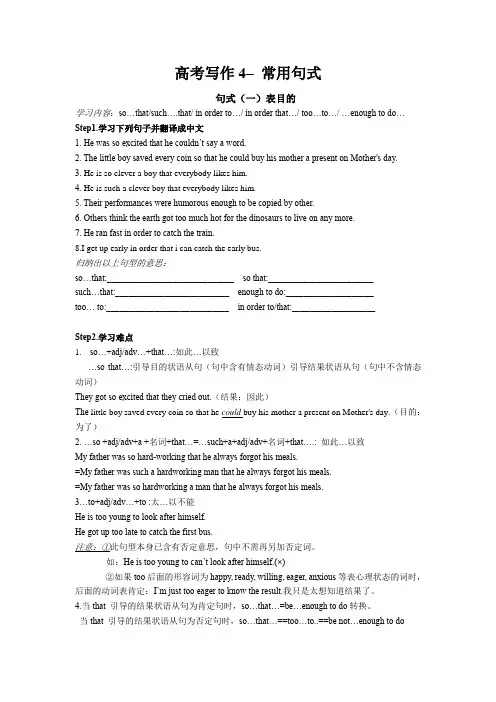
高考写作4– 常用句式句式(一)表目的学习内容:so…that/such….that/ in order to…/ in order that…/ too…to…/ …enough to do…Step1.学习下列句子并翻译成中文1. He was so excited that he couldn’t say a word.2. The little boy saved every coin so that he could buy his mother a present on Mother's day.3. He is so clever a boy that everybody likes him.4. He is such a clever boy that everybody likes him.5. Their performances were humorous enough to be copied by other.6. Others think the earth got too much hot for the dinosaurs to live on any more.7. He ran fast in order to catch the train.8.I get up early in order that i can catch the early bus.归纳出以上句型的意思:so…that:_____________________________ so that:________________________ such…that:__________________________ enough to do:____________________too… to:____________________________ in order to/that:___________________Step2.学习难点1.so…+adj/adv…+that…:如此…以致…so that…:引导目的状语从句(句中含有情态动词)引导结果状语从句(句中不含情态动词)They got so excited that they cried out.(结果:因此)The little boy saved every coin so that he could buy his mother a present on Mother's day.(目的:为了)2. …so +adj/adv+a +名词+that…=…such+a+adj/adv+名词+that….: 如此…以致My father was so hard-working that he always forgot his meals.=My father was such a hardworking man that he always forgot his meals.=My father was so hardworking a man that he always forgot his meals.3…to+adj/adv…+to :太…以不能He is too young to look after himself.He got up too late to catch the first bus.注意:①此句型本身已含有否定意思,句中不需再另加否定词。
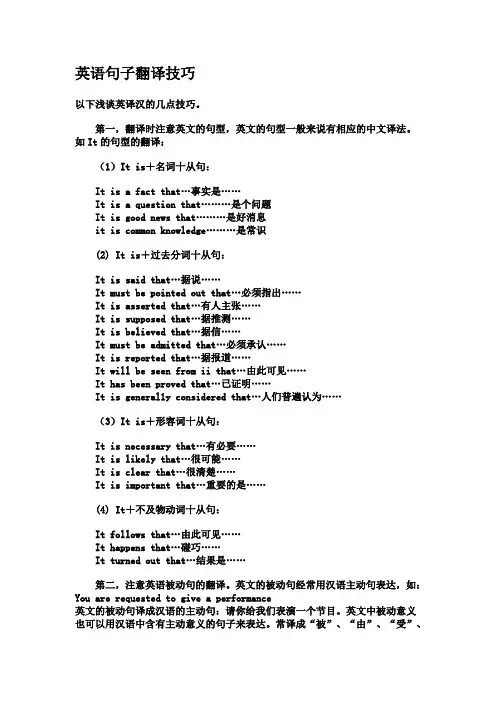
英语句子翻译技巧以下浅谈英译汉的几点技巧。
第一,翻译时注意英文的句型,英文的句型一般来说有相应的中文译法。
如It的句型的翻译:(1)It is+名词十从句:It is a fact that…事实是……It is a question that………是个问题It is good news that………是好消息it is common knowledge………是常识(2) It is+过去分词十从句:It is said that…据说……I t must be pointed out that…必须指出……It is asserted that…有人主张……It is supposed that…据推测……It is believed that…据信……It must be admitted that…必须承认……It is reported that…据报道……It will be seen from ii that…由此可见……It has been proved that…已证明……It is general1y considered that…人们普遍认为……(3)It is+形容词十从句:It is necessary that…有必要……It is likely that…很可能……It is clear that…很清楚……It is important that…重要的是……(4) It+不及物动词十从句:It follows that…由此可见……It happens that…碰巧……It turne d out that…结果是……第二,注意英语被动句的翻译。
英文的被动句经常用汉语主动句表达,如:You are requested to give a performance英文的被动句译成汉语的主动句:请你给我们表演一个节目。
英文中被动意义也可以用汉语中含有主动意义的句子来表达。

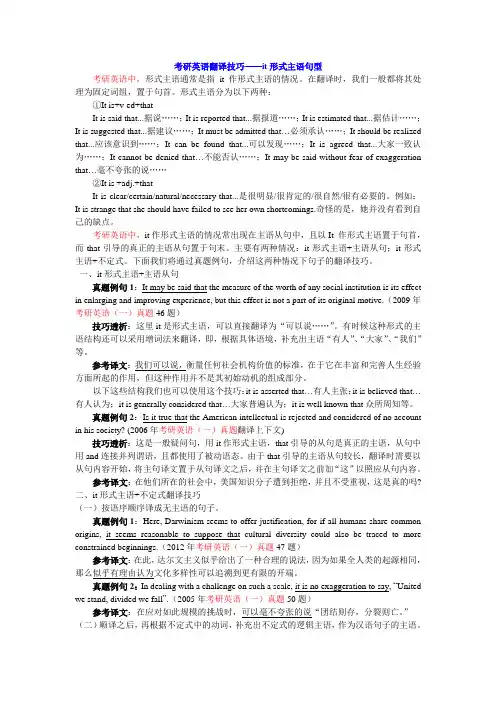
考研英语翻译技巧——it形式主语句型考研英语中,形式主语通常是指it作形式主语的情况。
在翻译时,我们一般都将其处理为固定词组,置于句首。
形式主语分为以下两种:①It is+v-ed+thatIt is said that...据说……;It is reported that...据报道……;It is estimated that...据估计……;It is suggested that...据建议……;It must be admitted that…必须承认……;It should be realized that...应该意识到……;It can be found that...可以发现……;It is agreed that...大家一致认为……;It cannot be denied that…不能否认……;It may be said without fear of exaggeration that…毫不夸张的说……②It is +adj.+thatIt is clear/certain/natural/necessary that...是很明显/很肯定的/很自然/很有必要的。
例如:It is strange that she should have failed to see her own shortcomings.奇怪的是,她并没有看到自己的缺点。
考研英语中,it作形式主语的情况常出现在主语从句中,且以It 作形式主语置于句首,而that引导的真正的主语从句置于句末。
主要有两种情况:it形式主语+主语从句;it形式主语+不定式。
下面我们将通过真题例句,介绍这两种情况下句子的翻译技巧。
一、it形式主语+主语从句真题例句1:It may be said that the measure of the worth of any social institution is its effect in enlarging and improving experience, but this effect is not a part of its original motive.(2009年考研英语(一)真题46题)技巧透析:这里it是形式主语,可以直接翻译为“可以说……”。
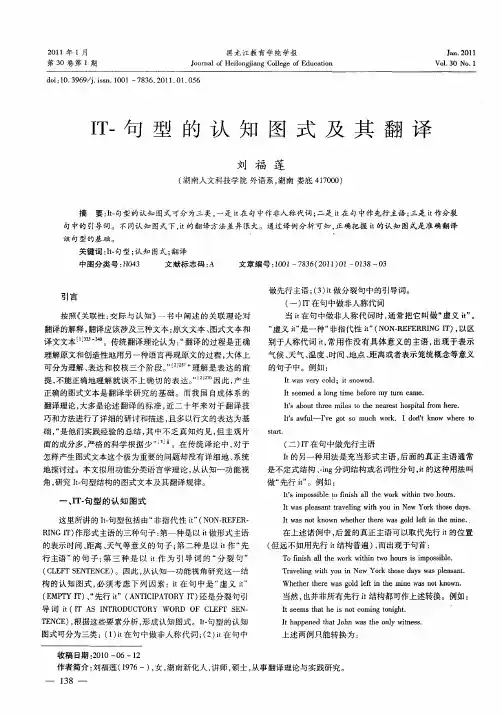
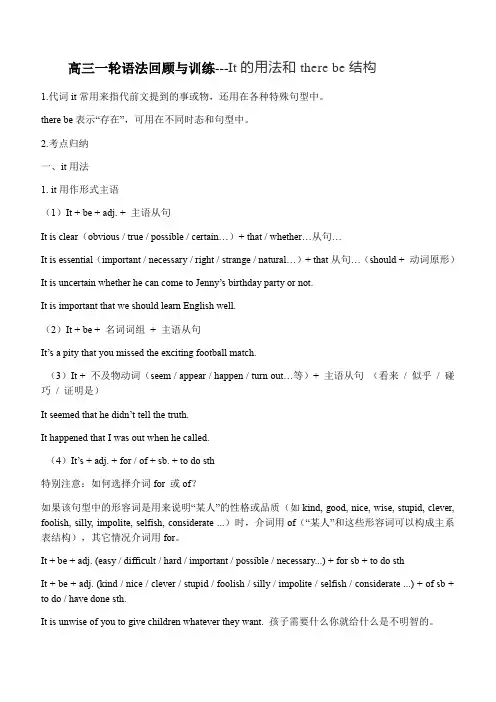
高三一轮语法回顾与训练---It的用法和there be结构1.代词it常用来指代前文提到的事或物,还用在各种特殊句型中。
there be表示“存在”,可用在不同时态和句型中。
2.考点归纳一、it用法1. it用作形式主语(1)It + be + adj. + 主语从句It is clear(obvious / true / possible / certain…)+ that / whether…从句…It is essential(important / necessary / right / strange / natural…)+ that从句…(should + 动词原形)It is uncertain whether he can come to Jenny’s birthday party or not.It is important that we should learn English well.(2)It + be + 名词词组+ 主语从句It’s a pity that you missed the exciting football match.(3)It + 不及物动词(seem / appear / happen / turn out…等)+ 主语从句(看来/ 似乎/ 碰巧/ 证明是)It seemed that he didn’t tell the truth.It happened that I was out when he called.(4)It’s + adj. + for / of + sb. + to do sth特别注意:如何选择介词for 或of?如果该句型中的形容词是用来说明“某人”的性格或品质(如kind, good, nice, wise, stupid, clever, foolish, silly, impolite, selfish, considerate ...)时,介词用of(“某人”和这些形容词可以构成主系表结构),其它情况介词用for。
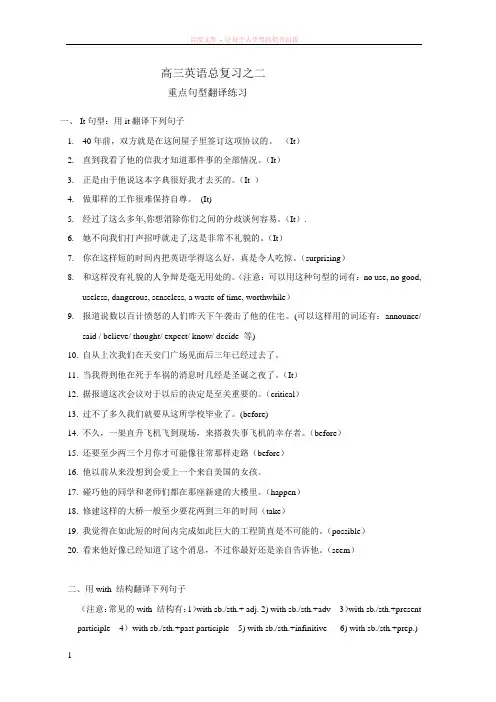
高三英语总复习之二重点句型翻译练习一、It句型:用it翻译下列句子1.40年前,双方就是在这间屋子里签订这项协议的。
(It)2.直到我看了他的信我才知道那件事的全部情况。
(It)3.正是由于他说这本字典很好我才去买的。
(It )4.做那样的工作很难保持自尊。
(It)5.经过了这么多年,你想消除你们之间的分歧谈何容易。
(It).6.她不向我们打声招呼就走了,这是非常不礼貌的。
(It)7.你在这样短的时间内把英语学得这么好,真是令人吃惊。
(surprising)8.和这样没有礼貌的人争辩是毫无用处的。
(注意:可以用这种句型的词有:no use, no good,useless, dangerous, senseless, a waste of time, worthwhile)9.报道说数以百计愤怒的人们昨天下午袭击了他的住宅。
(可以这样用的词还有:announce/said / believe/ thought/ expect/ know/ decide 等)10.自从上次我们在天安门广场见面后三年已经过去了。
11.当我得到他在死于车祸的消息时几经是圣诞之夜了。
(It)12.据报道这次会议对于以后的决定是至关重要的。
(critical)13.过不了多久我们就要从这所学校毕业了。
(before)14.不久,一架直升飞机飞到现场,来搭救失事飞机的幸存者。
(before)15.还要至少两三个月你才可能像往常那样走路(before)16.他以前从来没想到会爱上一个来自美国的女孩。
17.碰巧他的同学和老师们都在那座新建的大楼里。
(happen)18.修建这样的大桥一般至少要花两到三年的时间(take)19.我觉得在如此短的时间内完成如此巨大的工程简直是不可能的。
(possible)20.看来他好像已经知道了这个消息,不过你最好还是亲自告诉他。
(seem)二、用with 结构翻译下列句子(注意:常见的with 结构有:1)with sb./sth.+ adj. 2) with sb./sth.+adv 3)with sb./sth.+present participle 4)with sb./sth.+past participle 5) with sb./sth.+infinitive 6) with sb./sth.+prep.)1.有那么多人听他讲话,他感到很紧张。
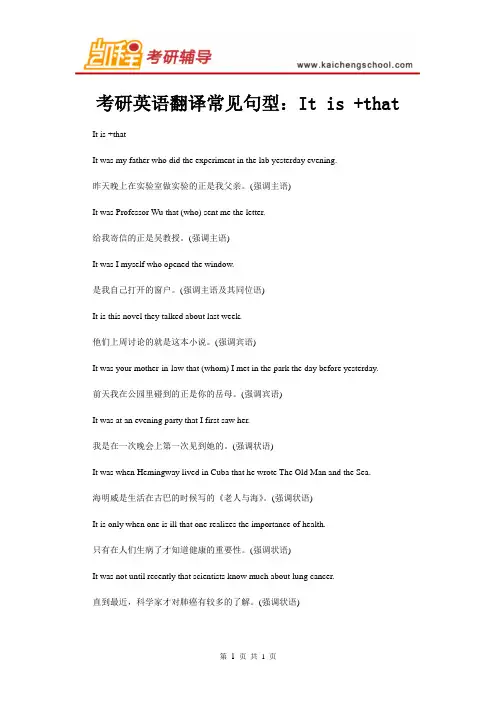
第 1 页 共 1 页 考研英语翻译常见句型:It is +thatIt is +thatIt was my father who did the experiment in the lab yesterday evening.昨天晚上在实验室做实验的正是我父亲。
(强调主语)It was Professor Wu that (who) sent me the letter.给我寄信的正是吴教授。
(强调主语)It was I myself who opened the window.是我自己打开的窗户。
(强调主语及其同位语)It is this novel they talked about last week.他们上周讨论的就是这本小说。
(强调宾语)It was your mother-in-law that (whom) I met in the park the day before yesterday.前天我在公园里碰到的正是你的岳母。
(强调宾语)It was at an evening party that I first saw her.我是在一次晚会上第一次见到她的。
(强调状语)It was when Hemingway lived in Cuba that he wrote The Old Man and the Sea.海明威是生活在古巴的时候写的《老人与海》。
(强调状语)It is only when one is ill that one realizes the importance of health.只有在人们生病了才知道健康的重要性。
(强调状语)It was not until recently that scientists know much about lung cancer.直到最近,科学家才对肺癌有较多的了解。
(强调状语)。
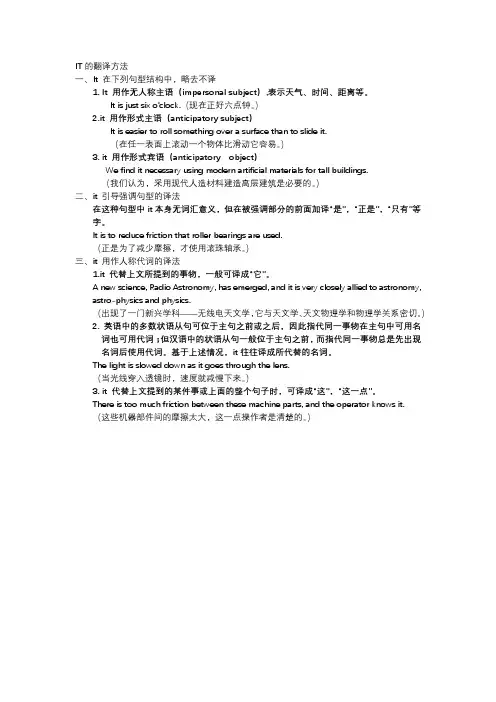
IT的翻译方法一、I t 在下列句型结构中,略去不译1. It 用作无人称主语(impersonal subject),表示天气、时间、距离等。
It is just six o’clock.(现在正好六点钟。
)2.it 用作形式主语(anticipatory subject)It is easier to roll something over a surface than to slide it.(在任一表面上滚动一个物体比滑动它容易。
)3. it 用作形式宾语(anticipatory object)We find it necessary using modern artificial materials for tall buildings.(我们认为,采用现代人造材料建造高层建筑是必要的。
)二、it 引导强调句型的译法在这种句型中it本身无词汇意义,但在被强调部分的前面加译“是”,“正是”,“只有”等字。
It is to reduce friction that roller bearings are used.(正是为了减少摩擦,才使用滚珠轴承。
)三、it 用作人称代词的译法1.it 代替上文所提到的事物,一般可译成“它”。
A new science, Radio Astronomy, has emerged, and it is very closely allied to astronomy,astro-physics and physics.(出现了一门新兴学科——无线电天文学,它与天文学、天文物理学和物理学关系密切。
)2. 英语中的多数状语从句可位于主句之前或之后,因此指代同一事物在主句中可用名词也可用代词;但汉语中的状语从句一般位于主句之前,而指代同一事物总是先出现名词后使用代词。
基于上述情况,it往往译成所代替的名词。
The light is slowed down as it goes through the lens.(当光线穿入透镜时,速度就减慢下来。
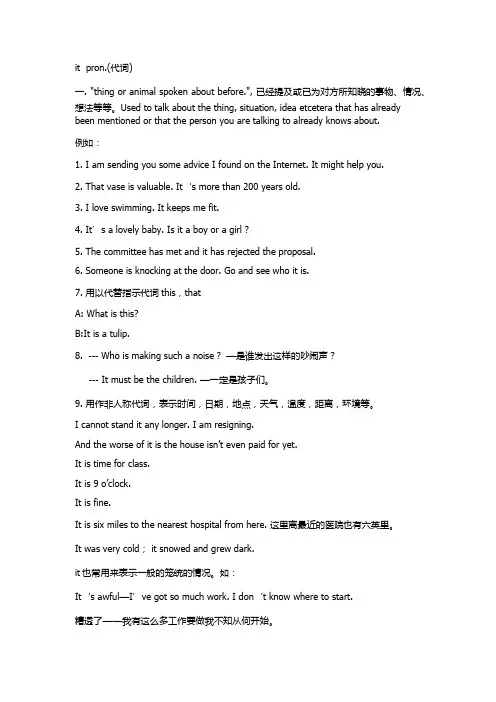
it pron.(代词)一. "thing or animal spoken about before.", 已经提及或已为对方所知晓的事物、情况、想法等等。
Used to talk about the thing, situation, idea etcetera that has already been mentioned or that the person you are talking to already knows about.例如:1. I am sending you some advice I found on the Internet. It might help you.2. That vase is valuable. It‘s more than 200 years old.3. I love swimming. It keeps me fit.4. It’s a lovely baby. Is it a boy or a girl?5. The committee has met and it has rejected the proposal.6. Someone is knocking at the door. Go and see who it is.7. 用以代替指示代词this,thatA: What is this?B:It is a tulip.8. --- Who is making such a noise?—是谁发出这样的吵闹声?--- It must be the children. —一定是孩子们。
9. 用作非人称代词,表示时间,日期,地点,天气,温度,距离,环境等。
I cannot stand it any longer. I am resigning.And the worse of it is the house isn’t even paid for yet.It is time for class.It is 9 o’clock.It is fine.It is six miles to the nearest hospital from here. 这里离最近的医院也有六英里。
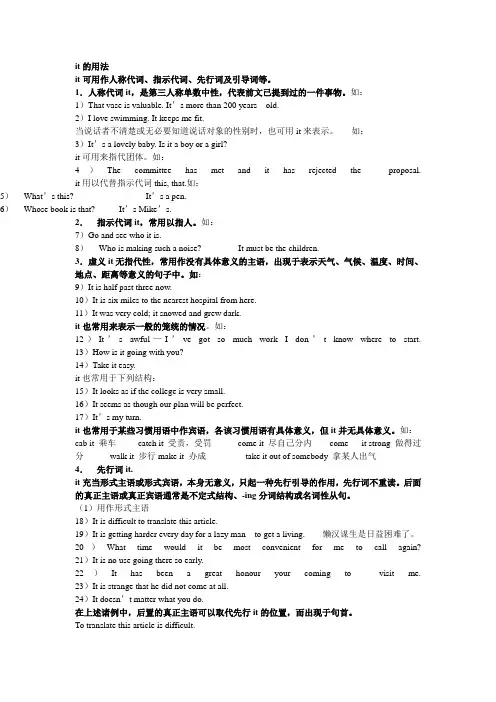
it的用法it可用作人称代词、指示代词、先行词及引导词等。
1.人称代词it,是第三人称单数中性,代表前文已提到过的一件事物。
如:1)That vase is valuable. It’s more than 200 years old.2)I love swimming. It keeps me fit.当说话者不清楚或无必要知道说话对象的性别时,也可用it来表示。
如:3)It’s a lovely baby. Is it a boy or a girl?it可用来指代团体。
如:4)The committee has met and it has rejected the proposal. it用以代替指示代词this, that.如:5)--- What’s this? --- It’s a pen.6)--- Whose book is that? --- It’s Mike’s.2.指示代词it,常用以指人。
如:7)Go and see who it is.8)--- Who is making such a noise? --- It must be the children.3.虚义it无指代性,常用作没有具体意义的主语,出现于表示天气、气候、温度、时间、地点、距离等意义的句子中。
如:9)It is half past three now.10)It is six miles to the nearest hospital from here.11)It was very cold; it snowed and grew dark.it也常用来表示一般的笼统的情况。
如:12)It’s awful—I’ve got so much work I don’t know where to start. 13)How is it going with you?14)Take it easy.it也常用于下列结构:15)It looks as if the college is very small.16)It seems as though our plan will be perfect.17)It’s my turn.it也常用于某些习惯用语中作宾语,各该习惯用语有具体意义,但it并无具体意义。
大学英语四级翻译常用句型1)It is+形容词+thatIt is conceivable thatknowledge plays an important role in our life.可想而知,知识在我们的一生中扮演着一个重要的角色。
2)It is+形容词+to do/ doingShe had said what it wasnecessary to say.她已经说了一切有必要说的话。
3)祈使句/名词+and/ orWork hard, and you willfinally be able to reach your destination.努力工作,你就能实现自己的目标。
4)as+many/ much+名词+asIt is said that visitorsspend only half as much money in a day in Leeds as in Lon-don.据说,游客每天在利兹的花销仅为在伦敦的一半。
5)倍数词+as+形容词+asThe reservoir is three timesas big as it was ten years ago.这个水库的面积是十年前三倍。
6) 倍数词+ more +名词/形容词十thanSmoking is so harmful topersonal health that it kills seven times more people each year than automobileaccidents.吸烟对人体健康的危害极大,每年死于吸烟的人比死于车祸的人多七倍。
7)(not)as/ so...as(和……(不)一样)The environmental problems arenot as serious as they suggested in their report.环境问题没有他们在报告中说得那么严重。
8)no more...than(与……一样不)She is no more fit to be amanager than a schoolgirl would be一个女学生固然不宜当经理,她也同样不宜。
高考英语长难句典型结构示例与解析(通用版) 10含有It的句型或There be等构成的长难句1.Another good thing about the use of noise-killing systems is that it saves the need for a silencer, which not only reduces the weight of a car, but also makes the motor burn less oil and work better.【句式翻译】噪音消除系统应用的另一好处就是没有必要使用消声器.这不仅减轻了轿车的重量,而且使发动机耗油更少,运转更好。
【句式分析】这是一个含有that引导的表语从句的复合句。
并且表语从句后接了which 引导的非限制性定语从句,代替整个上文的内容。
非限制性定语从句的两个谓语动词是一个由not only…but also…连接的并列结构。
【词语点拨】reduce v.减少;缩小;使落魄;简化;还原The new government's prime task is to reduce the level of inflation.新政府的首要任务是降低通货膨胀的水平。
We need to reduce our dependence on oil as a source of energy.在能源方面,我们需要减少对石油的依赖。
【语法点拨】非限制性定语从句的五个“不能”:①通常不能用that引导。
如:I like the book, which was bought yesterday. 我喜欢这本书,这是昨天买的。
②不能用why引导,要用for which代替why。
如:I had told them the reason, for which I didn’t attend the meeting.我已经把理由告诉了他们,为此我没有去开会。
|1. It is some time(一段时间) + since引导的时间状语从句= It has been some time(一段时间) + since引导的时间状语从句该固定句型意思是“自从...以来已经多久时间了”。
2. 其中要求since引导的从句必须采用一般过去时,而主句是一般现在时或现在完成时。
3. 补充:该从句的谓语动词是瞬间性动词时,从句正常翻译;而如果该从句的谓语动词是延续性动词作,从句必须作否定翻译。
如:It is two hours since he left the classroom.自从他离开教室以来,已经两个小时了。
It is three years since he worked there.自从他不在那儿工作以来,已经三年了。
例句:1. It is / has been four days since I caught a cold. 我感冒已四天了。
2. It is / has been two weeks since we met last. 自从我们上次见面以来已过了两周。
我们会发现“It is +段时间+since…..句型”在翻译成中文时,有绝然相反的两种意思,一是,“。
做。
有多长时间了。
”另一是“。
有多长时间没做。
了。
”怎样以简洁的讲解让学生明了。
我的意思是:先让比较两个句子的意思(中英文对照)。
如,It is five years since he became a soldier.他当兵已经五年了。
It is five years since he was a soldier..他不当兵已经五年了。
再如,It is two weeks since he fell ill .他病了两星期了。
It is two weeks since he was ill. 他病愈两星期了。
让学生观察since 从句中动词的特点吧。
第一种情况的动词是短暂性动词。
1. It is some time(一段时间) + since引导的时间状语从句= It has been some time(一段时间) + since引导的时间状语从句该固定句型意思是“自从...以来已经多久时间了”。
2. 其中要求since引导的从句必须采用一般过去时,而主句是一般现在时或现在完成时。
3. 补充:该从句的谓语动词是瞬间性动词时,从句正常翻译;而如果该从句的谓语动词是延续性动词作,从句必须作否定翻译。
如:It is two hours since he left the classroom.自从他离开教室以来,已经两个小时了。
It is three years since he worked there.自从他不在那儿工作以来,已经三年了。
例句:1. It is / has been four days since I caught a cold. 我感冒已四天了。
2. It is / has been two weeks since we met last. 自从我们上次见面以来已过了两周。
我们会发现“It is +段时间+since…..句型”在翻译成中文时,有绝然相反的两种意思,一是,“。
做。
有多长时间了。
”另一是“。
有多长时间没做。
了。
”怎样以简洁的讲解让学生明了。
我的意思是:先让比较两个句子的意思(中英文对照)。
如,It is five years since he became a soldier.他当兵已经五年了。
It is five years since he was a soldier..他不当兵已经五年了。
再如,It is two weeks since he fell ill .他病了两星期了。
It is two weeks since he was ill. 他病愈两星期了。
让学生观察since 从句中动词的特点吧。
第一种情况的动词是短暂性动词。
表示从这点开始。
it句型归纳总结大全"it"句型是英语中常见的一种句型结构,通常用来强调或者指代特定的事物或情况。
下面是对"it"句型的归纳总结:1. 强调句型:It is (was) + 被强调的部分 + that/who + 其余部分。
例,It is the book that I want to read.(我想读的就是这本书。
)。
例,It was Mary who broke the window.(打破窗户的是玛丽。
)。
2. 虚主语句型:It + be + 形容词 + to do.例,It is important to learn English well.(学好英语很重要。
)。
3. 虚宾句型:It + be + 名词 + to do.例,I find it a pleasure to work with you.(我觉得和你一起工作很愉快。
)。
4. 指代句型:It + be + 形容词 + (for sb.) + to do sth.例,It is easy for me to solve the problem.(对我来说解决这个问题很容易。
)。
5. 天气句型:It + be + adj. + (for sb.) + to do sth.例,It is hot for us to go out.(对我们来说出去很热。
)。
6. 距离句型:It + be + 距离 + to + 地点。
例,It is five kilometers to the station.(离车站还有五公里。
)。
以上是对"it"句型的归纳总结,希望对你有所帮助。
如果你还有其他问题,欢迎继续提问。
It 句型翻译1.难以置信,这次英语考试她竟然没有及格。
(believe)It is hard to believe he should have failed in the exam this time.2.你想得真周到,到来这么多雨伞,否则我们都要被雨淋湿了。
(thoughtful)It’s thoughtful of you to bring us so many umbrellas, or we will be caught in the rain.3.你明天开始工作方面吗?(convenient)Will it convenient to/ for you to start work tomorrow?4.住在如此小的房子里真不方便啊!(inconvenient)How inconvenient it is to live in such a small house!5.原定于明天召开的会议有可能推迟举行。
(likely)It is likely that the meeting to be held tomorrow will be put off.= The meeting to be held tomorrow is likely to be put off.6.我认为我们有可能会赢得这场比赛的胜利。
(likely)I think it likely that we’ll win the game.7.人们普遍认为,用脑越多,智力就越活跃。
(the more …, the more …)It is generally believed that the more our brains are used, the more active our intelligence will be.8.据估计,上海20年后将在许多方面赶上像纽约这样的国际大都市。
(estimate)It is estimated that Shanghai will catch up with the international cities like New York in many ways in 20 years.9.由于大雨,看来我们只能在山顶上过夜了。
(seem)It seems that we will have to stay overnight on the top of the mountain because of the heavy rain.10.你是否正确,以后可见分晓。
(remain)It remains to be seen whether you are right.11.这次会上做出的决定是否可行尚待证明。
(remain)It remains to be proved whether the decision made at the meeting will be practical.12.当我下火车时,天碰巧在下雨。
(happen)When I got off the train, it happened to be raining.13.病人昏倒时,旁边碰巧没人在。
(happen)It so happened that nobody else was around when the patient fainted.14.我突然想到我们可以用计算机来做这项工作。
(occur)It suddenly occurred to me that we could use a computer to do the job.15.我从没有想到过,她,一个新手,会被授予年度最佳歌手。
(occur)It never occurred to me / struck me that she, a green hand, was awarded the best singer of the year.16.你有没有想到过它会反对你的建议?(occur)Did it occur to you that he should be opposed to / be objected / be against your suggestion?17.汤姆每天花三小时做作业。
(take)It takes Tom 3 hours to do his homework everyday.18.应该是你们勇敢解决困难的时候了。
(time)It is high time you solved the problems bravely.19.不该由你告诉我怎么做我的工作。
(up to)It’s not up to you to tell me how to do my job.20.现在,电脑已使我们在家里就能以低价买到满意的货物。
(make it possible)Computers have made it possible for us to buy satisfying goods at a low price at home.21.巨型火箭的发明使人类能登上月球。
(make)The invention of the huge rocket made it possible for man to go to the moon.22.是老师的鼓励才使这位年轻人充满信心,不然的话,他不可能通过这次考试。
(without)It was the teacher’s encouragement that helped the young man to gain confidence, without which he couldn’t have passed the exam.23.我们一直想访问的是不是就是那家街道工厂?(it)Is it that neighborhood factory that we have been wanting to visit?24.你到底在什么时候,在哪里遇到那位著名的教授?(it)When and where was it that you met the famous professor?25.这是你第二次问我相同的问题了。
(It)It is the second time you have asked me the same question.26.第一次到英国的时候,我不习惯那里的气候。
(the first time)The first time I went to England, I wasn’t used to the climate there.27.我第一次听到如此美妙的音乐。
(for the first time)I heard such beautiful / merry music for the first time.28.他学习油画大约有五年了。
(take up)It is about 5 years since he took up oil painting.29.我把书寄给她已有一个星期了。
(It …)It is a week since I sent him the book.30.过了许多年他才知道是谁救了那位残疾儿童。
(before)It was many years before he knew who had saved that disabled child.31.不用多久时间,在这条河上就会建起一座桥。
(It …)It won't be long before a bridge is built over the river.32.经过似乎很长一段时间,他才成功地写完那部小说。
(before)It seemed to be a long time before he succeeded in finishing writing the novel.It 句型翻译1.难以置信,这次英语考试她竟然没有及格。
(believe)_______________________________________________________________________________________ 2.你想得真周到,到来这么多雨伞,否则我们都要被雨淋湿了。
(thoughtful)_______________________________________________________________________________________ 3.你明天开始工作方面吗?(convenient)_______________________________________________________________________________________ 4.住在如此小的房子里真不方便啊!(inconvenient)_______________________________________________________________________________________ 5.原定于明天召开的会议有可能推迟举行。
(likely)_______________________________________________________________________________________ 6.我认为我们有可能会赢得这场比赛的胜利。
(likely)_______________________________________________________________________________________ 7.人们普遍认为,用脑越多,智力就越活跃。
(the more …, the more …)_______________________________________________________________________________________ 8.据估计,上海20年后将在许多方面赶上像纽约这样的国际大都市。
(estimate)_______________________________________________________________________________________ 9.由于大雨,看来我们只能在山顶上过夜了。
(seem)_______________________________________________________________________________________ 10.你是否正确,以后可见分晓。
(remain)_______________________________________________________________________________________ 11.这次会上做出的决定是否可行尚待证明。